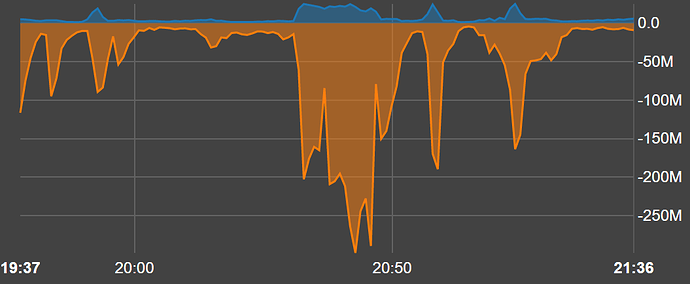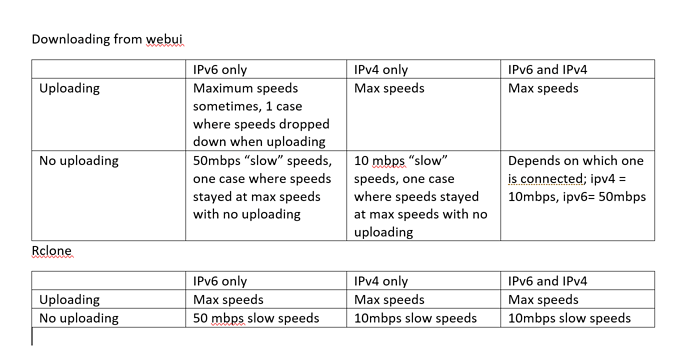A VPN does in fact fix it. So does connecting to a different network. It is starting to seem like Comcast more and more. Though my internet searches haven’t brought up anyone with a similar issue.
I might have a similar issue (yours was the most similar to mine I could find anyway). I don't know if it's the same issue. For me download speeds go to normal when I upload something on my network.
See this Topic:
And this update:
@m1dy
I think I have discovered something new about my setup from your comment. Uploading fixes the issue for me as well. Now that I think about it, I was uploading something the other night when I found that the speeds were “suddenly” fine. It was the uploading that made the speeds go back to normal… This also fixed my download speeds from the web ui as well! (though I would really rather not constantly be uploading files to Gdrive…) Also wanted to add that I have the same results where it doesn’t matter what computer I am uploading from as long as I am uploading somewhere on my local network (same as you).
I’ve also discovered that the uploading speed has to reach a certain minimum speed. I tried speeds of 10kbps and found that it didn’t affect speeds at all. Only when I increased it to 2MB/s did it allow everything to go back to normal. 1MB/s wasn’t enough. Can you try to see if you get the same results with uploading?
I see that a VPN also fixed the issue for you as well… Are you using Comcast? What region are you in? I am in the Chicagoland area.
I’ve discovered another incredible thing about the uploading. It doesn’t even have to be to Gdrive! Running a remote Plex stream, I can see the mount pulling data at my maximum connection speed. Only when I run a local Plex stream does it go back to the slow speeds.
This answers why #2 in the op was occuring. It seems that just uploading in general causes it to work normally again. It also answers #1 in the op as well. My Plex playbacks have always been remote playbacks which means it was always uploading…
When running an upload speedtest while reading a file from mount, I can see the download speeds instantly shoot up and drop back down after the test is complete.
So the conclusion is that it has something to do with uploading files (potentially a modem issue??)
@ayao
I’m happy to know that I am not the only one with this rather mysterious issue 
As I was describing in my update post in the topic I created I also discovered that it doesn’t matter what gets uploaded and whereto. It even doesn’t matter if it is another computer in my local network that uploads to get full speed download on my machine.
In regard to how different upload speeds affects download speed my observations where very similar to yours.
I’m in germany and I’m using the cable internet provider Vodafone. My router (provided by my provider) is a “Fritz!Box 6490 Cable”. So we can at least rule out that it has something to do with our location or our router (as you most probably have another router).
But as I see it everything points to either the router, the integrated modem or provider. Which is confusing as we have (semi-) ruled these things out?
I find this all just.. interesting. Sure sounds like internet provider throttling.  Set up a 1MB constant upload with rclone with a bw-limit to some vps or Google compute (ingress is free so it'll cost you pennies) and just let it run.
Set up a 1MB constant upload with rclone with a bw-limit to some vps or Google compute (ingress is free so it'll cost you pennies) and just let it run.
For me, my network setup (sophos xg vm > pfsense vm > gateway in bridge mode Comcast xb6) is very complicated, but I connected a device directly to the modem bypassing my router and still had the issue.
I'll see if calling them helps at all or see if they will let me swap out their modem with my old modem.
If Comcast is throttling Gdrive, wouldn't other people with Comcast notice? I don't understand why I would seemingly be the lone person. Strange...
Good question but it sure smells like it. Comcast and Xfinity do a lot of "interesting" things.
I'm pretty sure that my internet provider doesn't throttle anything. Also it wouldn't make sense that uploading disables the throttling.
Then why does a VPN fix things?
Thats what I'm questioning as well. Though it seems strange that if our ISPs were throttling, why would they stop throttling when uploading? Also it seems strange that we would both have the same experiences with two completely different ISPs. Is there some throttling that gets disabled by uploading? I find that hard to imagine.
The only thing I conceivably say for why the VPN fixes things is that it bypasses something the modem is doing? Maybe the modem/router is at fault? Or its unintentional throttling? I did find this which is very recent but a rep said that they don't throttle.
I would doubt they throttle as it takes quite a bit of effort to throttle something so specific.
Most cases things like this come to peering and the VPN bypasses the peering and give you a new route or it's something specific in your home setup.
Peering was one of my guesses as well but it doesn't make sense in this scenario. Starting a download is slow until I begin uploading something to anywhere. I don't see how uploading could change the peering.
I think your scenario is definitely on the odd side.
You'd probably want to get a packet capture and if you got a friend that can dig through it, that would be my next steps.
Your issue feels like something just plain not working right in your setup locally and nothing outside.
I'm not quite sure about that. @m1dy replied with the exact same issue with a completely different ISP in a different part of the world. The situation though is very strange and puzzling.
A look at Wireshark during a download doesn't reveal anything. I see the same packets transferred, just faster when uploading.
Two people with the same cough doesn't equate to the same problem. He/She described a similar symptom to what you are seeing with more variables in the equation.
Once your traffic starts up, it can pass you off to a different link/route based on the bandwidth you are requesting.
We have quite the number of variables going on so isolation and identifying the broken piece is a bit tough since we can't see all the pieces in the route from you to your GD.
If you plug into your modem directly, repeat the tests with a download with / without VPN in the middle, that can give you an idea on peering and/or Comcast doing something funny.
The packet capture would show things like packets of order, resets and other things that might lead to something as well.
For an ISP to throttle very specific HTTPS traffic out just seems super odd in itself as they would normally go for torrent traffic / higher profile stuff.
I used to see very 'strange' thing on Comcast and all that magically went away when I moved over to FIOS, it was golden.
Haven't gotten the chance to look very much further into it, but I here is just more information about the observed behavior.
Notice the blue upload spikes and the resulting download spikes that disappear shortly after the upload spikes stop.
I've done some testing connected directly to my modem and have seen some strange results with ipv6 and ipv4 interactions. Here's a table with my results. Can you try doing the same to see if you have these same results?
Sorry for the late reply. I was on vacation till today.
I had already testet multiple variations of IPv6/IPv4 transfers and WebUI, rclone and Drive File Stream.
No uploading:
For me WebUI always has fullspeed download. Rclone and Drive File Stream always has speeds of ~5mbit-50mbit. Transfering with IPv6 or IPv4 doesnt make any difference for me.
Uploading:
Max speeds for everything.
The download speed with "no uploading" probably jumps up and down so much because I didn't connect my PC directly to the modem because it's a pain to do so in my current setup. There are many devices on my network that use a little bit of upload here and there.
But a few weeks ago I actually did connect a PC directly to my modem with nothing else attached and while I didn't test it as rigorously as I did without a direct connection it didn't seem to matter that I connected it directly.

